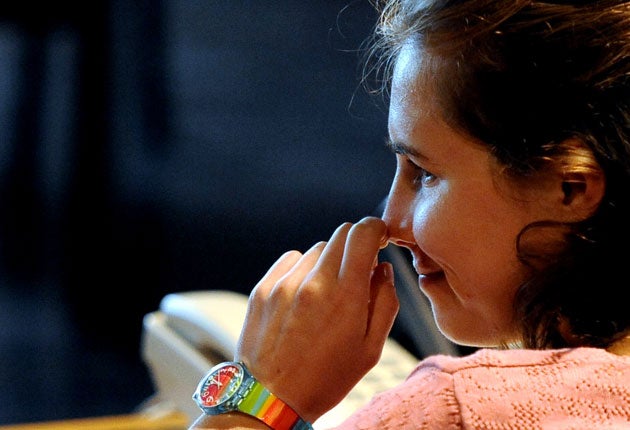'Unreliable' DNA evidence in Knox case
Defence experts criticise Italian police and say some forensics were contaminated by investigators

Your support helps us to tell the story
From reproductive rights to climate change to Big Tech, The Independent is on the ground when the story is developing. Whether it's investigating the financials of Elon Musk's pro-Trump PAC or producing our latest documentary, 'The A Word', which shines a light on the American women fighting for reproductive rights, we know how important it is to parse out the facts from the messaging.
At such a critical moment in US history, we need reporters on the ground. Your donation allows us to keep sending journalists to speak to both sides of the story.
The Independent is trusted by Americans across the entire political spectrum. And unlike many other quality news outlets, we choose not to lock Americans out of our reporting and analysis with paywalls. We believe quality journalism should be available to everyone, paid for by those who can afford it.
Your support makes all the difference.Vital DNA evidence used to convict the American student Amanda Knox of murdering her British room-mate, Meredith Kercher, was unreliable and possibly contaminated, independent forensic experts told an Italian court yesterday.
Knox, 24, is serving 26 years after she was convicted of sexually assaulting and murdering Kercher in the apartment the two shared in Perugia in 2007. Knox's ex-boyfriend and co-defendant Raffaele Sollecito, 27, of Italy, was convicted of the same charges and jailed for 25 years. Both are appealing against their convictions.
Key to Knox's conviction was a 30cm kitchen knife, found at Sollecito's apartment. Police claimed that Knox's DNA was found on the handle and that of Kercher on the blade. But defence experts professors Stefano Conti and Carla Vecchiotti, said they could find no traces of blood on the knife. They added that the DNA from the blade was so small it should be considered "inadmissible". The experts, appointed by the Appeal Court in Perugia to review evidence and procedures, said they found more than 50 errors in the original investigation.
They reviewed the procedures used to test the DNA material and determined the genetic quantity was below the minimum amount necessary for the test to be considered reliable, according to international standards.
Vecchiotti, from Rome's La Sapienza university, told the court: "There is a complete genetic profile [on the blade DNA], but it's not reliable. We don't know if Meredith's DNA was on it or not."
They were also critical of how police had examined a clasp from Kercher's bra found at the scene and which had been "lost" for six weeks before being discovered.
Footage showed the officers picking up the clasp with dirty gloves, handing it to each other, and dropping it on the floor before picking it up without using tweezers. Other breaches included face masks not being worn and hair not being in caps, while other unknown people were also admitted into the crime scene.
Police chief Piero Angeloni later defended his forensic science team when they were branded incompetent. In a letter read to the court, Angeloni, head of the Italian Police Scientific Unit, rejected claims that his team had made more than 50 mistakes, saying the accusations undermined police work and damaged its image.
"My department adheres to all the recognised international protocols and carries out more than 25,000 crime-scene investigations every year. Never has anyone questioned our methods before in such a way. All my staff are highly professional and are taught by experts over a four-month course and they have a yearly audit. We use state-of-the-art equipment and techniques. This is a very competent organisation," he maintained.
Join our commenting forum
Join thought-provoking conversations, follow other Independent readers and see their replies
Comments